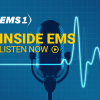Download this week’s episode on iTunes, SoundCloud or via RSS feed
In this week’s Inside EMS Podcast, hosts Chris Cebollero and Kelly Grayson wonder if EMS is safe from outsourcing after news about AMR closing billing operations in California and hiring overseas contractors in India and the Philippines.
“I guess EMS now is not safe from the outsourcing bug,” Cebollero said.
Grayson noted that in general, large ambulance conglomerates are often owned by international firms and keeping jobs in America may not be a priority.
“Obviously they’re not going to be able to outsource the actual medic jobs,” Grayson said. “The bottom line is AMR is a business.”
He wondered how much of the billing could be kept stateside if the company’s revenue collection and generation were more efficient.
Cebollero said it also opens the door for other large ambulance companies to follow suit if AMR is successful.
In other news, they discussed responders in Wisconsin getting training to better handle patients with dementia.
“I think it’s something that’s underserved in EMS,” Grayson said.
And they debate how a man in Brazil survived for three hours with a knife in his head after a brawl. Likely due to shock and alcohol, he didn’t realize the knife was there.
“I don’t even know how he survived,” Cebollero said. “It really is miraculous … How do you treat that?”
“Don’t remove the impaled object, that’s for sure,” Grayson quipped.
In the Clinical Issue, they wonder if EMS, and health care providers in general, have been too focused on technology when it comes to treating patients.
Rather than building a rapport and making patients too comfortable, are EMTs and paramedics spending too much time in front of their computers, or using equipment? Is patient assessment a lost art?
“It seems we’ve gotten more robotic with our patient assessment,” Cebollero said. “Rather than it being really personal, it’s become very, very technical.”
Grayson agreed, saying this concept also extends to hospitals and doctor’s offices, and said students are graduating from paramedic programs with an “analysis paralysis.”
“It’s much easier for them to look at a machine and ask a quick question here and there,” he said, “rather than sit down on the side of the bed and take a pulse, and hold a patient’s hand, and actually get a history from them.”












